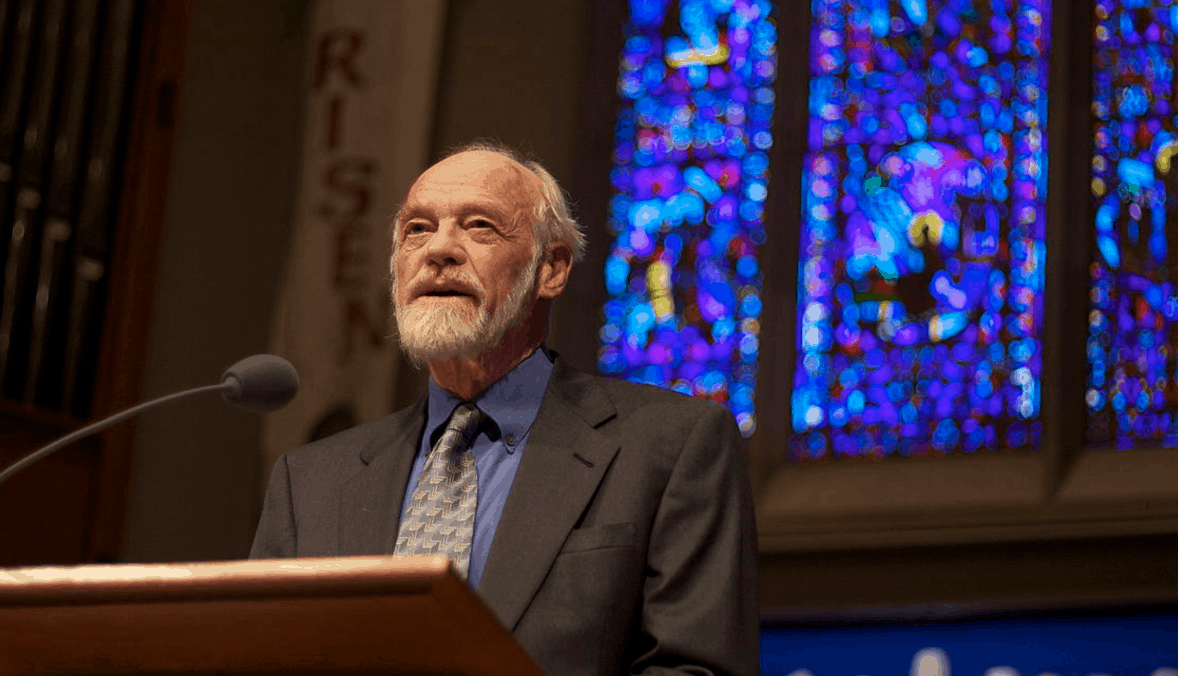
Eugene Peterson, who died October 22nd at 85, authored more than 30 books while serving as the pastor of Christ Our King Presbyterian Church in Bel Air, Maryland. Today would have been his 86th birthday.
In a 2017 interview with Religion News Service, Peterson said that he didn’t fear death. “I don’t think it’s anything to be afraid of. I have no idea how it’s going to work out. But I’m not afraid, I’ll tell you that.”
Incidentally, the ability to resist fear in all forms is arguably the legacy of Eugene Peterson, courtesy of The Message, his contemporary paraphrase of the Bible that’s sold more than 16 million copies worldwide. To put another way: as Peterson wasn’t anxious about his impending death, people—all people—shouldn’t be anxious or trepidatious about reading the Scriptures. Readability, creativity, and accessibility underscore this position, and each merit a closer look.
Readability.
Growing up in the Church of God, I read the King James Version (KJV) Bible more than a time or two. At 36, I sporadically revisit this translation as there’s a regal elegance about the language, but there’s no mistaking the straightforward approach of Peterson with The Message. Consider Isaiah 26:3 in the KJV, which says, “Thou wilt keep him in perfect peace, whose mind is stayed on thee: because he trusteth in thee.” The point is clear. Focus your thoughts on God and he will provide perfect peace. Still, thou and thee can be cumbersome for readers.
The Message paraphrase renders Isaiah 26:3 as follows: “People with their minds set on you, you keep completely whole.” So, what does whole mean? The obvious synonyms are full, satisfied, or replete. Peterson’s paraphrase of Isaiah’s words appears to be a far cry from the King James Version, but readability is easier. In fact, on the subject of wholeness, a man or woman who’s fully satisfied in God, to paraphrase Dr. John Piper, is more likely to be at perfect peace.
Creativity.
“The Message finds an audience with people normally intimidated by the Bible and, on the other side of the spectrum, scholars who recognize Peterson’s deep and impressive knowledge of Hebrew, Greek, and English (yes, he did all his own translations from the original languages),” wrote Aaron Cline Hanbury in a 2017 July/August issue of RELEVANT.
Clearly there’s a creativeness about Peterson; otherwise, he wouldn’t have devoted 12 years to translating and subsequently writing The Message. As a result of his innovative approach, stirring words emerge from verse to verse. Take Proverbs 3:5-6, two well-known, beloved declarations about trust. “Trust in the Lord with all your heart, and do not lean on your own understanding. In all your ways acknowledge him, and he will make straight your paths” (ESV).
“Trust God from the bottom of your heart; don’t try to figure out everything on your own. Listen for God’s voice in everything you do, everywhere you go; he’s the one who will keep you on track,” writes Peterson. In my reading, The Message paraphrase brings “fresh wind” from God by way of Peterson’s creative heart. He provides readers with fresh imagery about God’s redemptive mission to restore people to himself through the life, death, resurrection, ascension, and eventual return of Jesus Christ.
Accessibility.
Sixteen million copies of The Message attests to its popularity, but this figure serves to affirm the truth that 16 million people are reading the Bible. Yes, many of those millions who purchased a copy of The Message already live under the lordship of Christ, but I’m not hesitant to believe that thousands more discovered Christ for the first time by receiving Peterson’s seminal work from a family member or friend. “All Scripture is breathed out by God and profitable for teaching, for reproof, for correction, and for training in righteousness,” writes Paul to Timothy (2 Timothy 3-16-17). I’m excited for the people who have profited spiritually from the teaching, reproof, correction, and maturity that’s blossomed in their souls as a result of time in The Message.
With the exponential growth and corresponding use of mobile technology over the past twenty years, The Message, like other translations of the Bible, is more accessible than ever, thanks in large part to apps. There’s always a compelling case for time in a printed Bible, but the Scriptures are now only a click (or is it touch?) away from purposeful opportunities for spiritual growth with the living God.
A Paraphrase that Resonates
As I’ve noted, The Message is a paraphrase of the Bible, an idiomatic translation that is read best as a complement to those translations that are highly regarded by biblical scholars. Speaking of translations, the YouVersion app (developed by Life.Church) contains 1,769 versions of the Bible in 1,244 languages as of this writing, which clearly provides readers with, in the words of American religion and culture instructor Daniel Silliman, “a mix of firm authority and breezy accessibility.” In short, there’s no shortage of Bibles to accommodate theological preferences.
Indeed, the Bible—or in recent years—study Bibles, help readers make sense of verses that are unclear at first glance. That said, although the New International Version (NIV) and English Standard Version (ESV) Bibles are immensely popular from a resource and readability standpoint, the simple vernacular of The Message still resonates. I own a parallel Bible, which places The Message text next to the NIV, and Peterson’s paraphrase regularly brightens God’s already radiant Word that remains living and active and soul-changing. That’s quite a legacy.






















